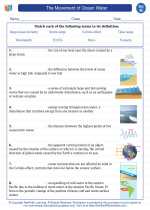Pond Ecosystem
A pond is a small body of still water that is typically shallow enough for sunlight to reach the bottom. Ponds are home to a wide variety of plants and animals, and they form complex ecosystems. Ponds can be found in various environments, from forests to grasslands, and they play a crucial role in supporting biodiversity.
Abiotic Components of a Pond
- Water: The primary abiotic component, water provides habitat, supports various chemical processes, and regulates the pond's temperature.
- Soil and Sediments: Accumulated at the bottom of the pond, these provide anchorage for aquatic plants and serve as a substrate for various organisms.
- Light: Sunlight is essential for photosynthesis in aquatic plants, which form the base of the pond's food web.
- Oxygen: Dissolved oxygen is crucial for the survival of aquatic organisms, and it enters the pond through diffusion and photosynthesis.
Biotic Components of a Pond
- Aquatic Plants: These include submerged plants, floating plants, and emergent plants, all of which contribute to the pond's productivity and provide habitats for various organisms.
- Algae: Microscopic algae are primary producers, forming the base of the food chain and contributing to oxygen production through photosynthesis.
- Animals: From tiny zooplankton to large fish, ponds support a diverse array of animal life, including insects, amphibians, reptiles, and birds.
- Microorganisms: Bacteria, fungi, and protozoa play crucial roles in nutrient cycling and decomposition processes within the pond ecosystem.
Ecological Interactions in Ponds
Ponds exhibit a variety of ecological interactions, including predation, competition, mutualism, and parasitism. These interactions shape the structure and functioning of the pond ecosystem, influencing population dynamics and community stability.
Human Impact on Ponds
Human activities such as pollution, habitat destruction, and introduction of invasive species can have detrimental effects on ponds and their inhabitants. Conservation efforts are essential for preserving the biodiversity and ecological integrity of pond ecosystems.
Study Guide
Here are some key topics to focus on when studying the pond ecosystem:
- Identify and describe the abiotic components of a pond ecosystem.
- Explain the roles of aquatic plants and algae in pond ecosystems.
- Discuss the ecological interactions that occur in pond ecosystems.
- Analyze the impact of human activities on pond ecosystems and the importance of conservation efforts.
Understanding the complexities of pond ecosystems and the interactions between abiotic and biotic components is crucial for appreciating the ecological significance of these habitats.
[Pond] Related Worksheets and Study Guides:
.◂Science Worksheets and Study Guides Eighth Grade. The Movement of Ocean Water

 Worksheet/Answer key
Worksheet/Answer key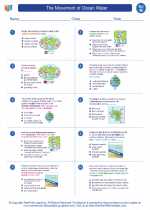
 Worksheet/Answer key
Worksheet/Answer key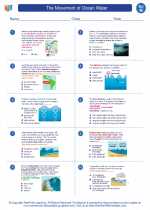
 Worksheet/Answer key
Worksheet/Answer key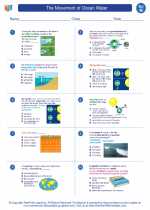
 Vocabulary/Answer key
Vocabulary/Answer key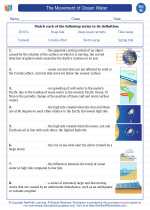
 Vocabulary/Answer key
Vocabulary/Answer key